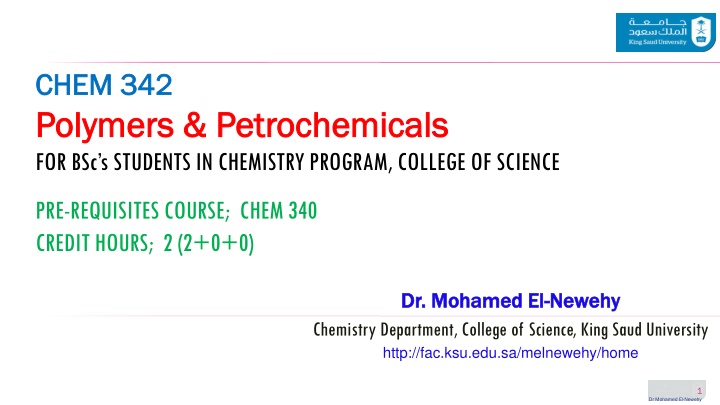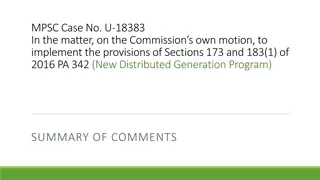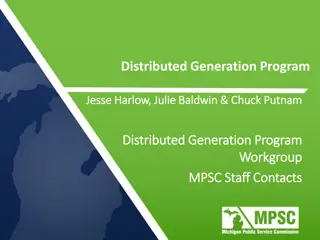
Polymer Chemistry Course for BSc Chemistry Students
"Explore the world of polymers and petrochemicals with this comprehensive course designed for BSc Chemistry students. Dive into topics like polymer synthesis, copolymerization, degradation, and more. Includes references for further study."
Download Presentation

Please find below an Image/Link to download the presentation.
The content on the website is provided AS IS for your information and personal use only. It may not be sold, licensed, or shared on other websites without obtaining consent from the author. If you encounter any issues during the download, it is possible that the publisher has removed the file from their server.
You are allowed to download the files provided on this website for personal or commercial use, subject to the condition that they are used lawfully. All files are the property of their respective owners.
The content on the website is provided AS IS for your information and personal use only. It may not be sold, licensed, or shared on other websites without obtaining consent from the author.
E N D
Presentation Transcript
CHEM 342 CHEM 342 Polymers & Petrochemicals Polymers & Petrochemicals FOR BSc s STUDENTS IN CHEMISTRY PROGRAM, COLLEGE OF SCIENCE PRE-REQUISITES COURSE; CHEM 340 CREDIT HOURS; 2 (2+0+0) Dr. Mohamed El Dr. Mohamed El- -Newehy Chemistry Department, College of Science, King Saud University http://fac.ksu.edu.sa/melnewehy/home Newehy 1 Dr Mohamed El-Newehy
COURSE OBJECTIVES COURSE OBJECTIVES Upon Upon successful successful completion completion of of this this course, course, the the student student will will be be able able to to: : o Learn Learn the stereochemistry stereochemistry of of polymers the polymer polymer definitions, polymers and definitions, different and their their physical different classification classification systems, physical and and chemical chemical properties systems, the properties. . the o Learn Learn the polymerization) polymerization). . the general general methods methods for for polymer polymer synthesis synthesis (condensation (condensation and and addition addition o Learn Learn what o Learn Learn the applications applications. . what is is the the copolymerization copolymerization. . the different different types types of of polymerization polymerization techniques techniques and and industrial industrial o Learn Learn about petrochemicals petrochemicals production about oil oil (origin, (origin, composition, production. . composition, importance) importance) and and methods methods of of o Learn Learn about about composition composition and and petrochemicals petrochemicals from from natural natural gas gas. . 2
TOPICS TO BE COVERED TOPICS TO BE COVERED 1) 1) Introduction Introduction and General General methods Addition Addition polymerization polymerization. . and definitions, definitions, methods for for Polymer Polymer Synthesis 1st st Midterm Exam Midterm Exam Synthesis; ; Condensation Condensation polymerization polymerization and ( (10 10 hours) hours) and 2 2) ) Different Different polymerization polymerization techniques techniques and and applications applications. . ( (4 4 hours) hours) 3 3) ) Copolymerization Copolymerization. . ( (4 4 hours) hours) 4 4) ) Degradation Degradation and and stabilization stabilization of of polymers polymers. ( (2 2 hours hours) ) 5 5) ) Petroleum Petroleum and and petrochemicals petrochemicals from from benzene, benzene, toluene 2 2nd Midterm Exam toluene and Exam and xylene xylene. ( (4 4 hours hours) ) nd Midterm 6 6) ) Petrochemicals Petrochemicals from from natural natural gas gas. . ( (4 4 hours) hours) 3
REFERENCES REFERENCES 1) Fundamentals of Polymerization, Broja M Mandal, World Scientific, 2013. 2) Polymer Chemistry, Koltzenburg, Sebastian, Maskos, Michael, Nuyken, Oskar, Springer, 2017. 3) Textbook of Polymer Science, Fred W. Billmeyer, 3rd, 1984. 9960 - 27 - 277 - 1423 4 ) 4
Schedule of Assessment Tasks During the Semester Schedule of Assessment Tasks During the Semester Proportion of Total Proportion of Total Assessment Assessment task task Week Due Week Due Assessment Assessment 10 % 10 % 20 % 20 % 40 % 40 % 1. Homework and Research project 2. Quizzes 4. 1st Midterm exam 5. 2nd Midterm exam 6. 6. Final exam Final exam 14 4, 8 5 10 17 17 5 5






















